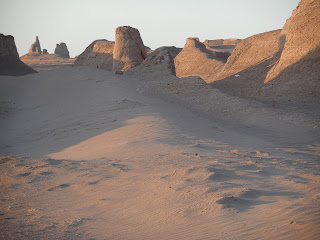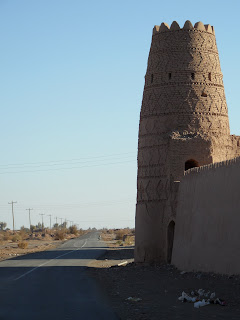In the garden of Akbar's Tourist Guesthouse, the palm leaves overhead rustling in the gentle breeze, I'm thumbing a large guestbook marked '1998'. Its pages are yellow and stained, and many have come undone over the years. The entries, however, are far from musty. Many kind words to the owner, of course, but also wonderfully detailed travel tips: where to go in Iran, which Pakistani hotels to avoid, how to recognise counterfeit Afghan banknotes. Silly jokes abound. Some travellers attached mugshots—hairdos and spectacles betraying that 1998 indeed lies further in the past than I would like to admit.
'I found those guestbooks two years after the earthquake,' Akbar says. 'It took us that long to clear the rubble. They're one of the few things I still have from the old days. I dip into them whenever I feel down. Always lifts my spirits.' His hands clench the armrests while he speaks, the skin translucent and papery like the pages in front of me.
In many ways Bam feels like the end of the world. Squeezing the desert highway to a road just wide enough for two lorries to pass, this oasis town very much marks the divide between urbane Iran and the sheer emptiness that is the southeastern province of Balochistan—a place so barren that only the most determined of shrubs stick it out (along with the odd drug trafficker and one or two unruly tribes). For many years, Bam served as a staging post for those en route to the Indus valley, some 1400 kilometres beyond. Its tranquil streets lined with date palms made it the perfect spot to unwind and brace yourself for the trip ahead, while Bam's Unesco-listed citadel ranked as one of Iran's star attractions. Then disaster struck. On 26 December 2003 a massive earthquake flattened the town, claiming the lives of one-third of its population and not just damaging but pulverising its 2500-year-old citadel.
Bam quickly scrambled to its feet. Many homes have been rebuilt and an international team of experts even set themselves the herculean task of reconstructing the citadel. But despite the efforts the ghost of the earthquake still lingers. The empty lots give the streets a gap-toothed appearance, and what is there is either unfinished or very new. What's more, local tourism took a bad hit. With the destruction of the citadel the town lost much of its appeal.
Akbar's face shows no sign of emotion as he describes the day that changed everything. Two guests died. His son lost his best friend. The guesthouse was turned into a heap of broken bricks. For months life was lived under the canvas of Red Crescent tents. 'We're back on our feet. But it's difficult. The days of tourism are over. I have no choice but to let our rooms to Pakistani merchants who come here to buy dates.'
The sound of the wind playing through the date palms fills the silence. Dates, Bam's divine dates. Only the palm trees survived the earthquake unscathed. They're all the community has left.
Akbar heaves himself out of his chair and smiles. 'Before you go,' he says, 'don't forget to sign our guestbook. It's more than ink on paper you leave behind.'
I pick up a pen and add my voice to an inaudible chorus of ghosts.
 |
| Where to start? |
In many ways Bam feels like the end of the world. Squeezing the desert highway to a road just wide enough for two lorries to pass, this oasis town very much marks the divide between urbane Iran and the sheer emptiness that is the southeastern province of Balochistan—a place so barren that only the most determined of shrubs stick it out (along with the odd drug trafficker and one or two unruly tribes). For many years, Bam served as a staging post for those en route to the Indus valley, some 1400 kilometres beyond. Its tranquil streets lined with date palms made it the perfect spot to unwind and brace yourself for the trip ahead, while Bam's Unesco-listed citadel ranked as one of Iran's star attractions. Then disaster struck. On 26 December 2003 a massive earthquake flattened the town, claiming the lives of one-third of its population and not just damaging but pulverising its 2500-year-old citadel.
 |
| Box of dates showing the citadel in its former glory |
Akbar's face shows no sign of emotion as he describes the day that changed everything. Two guests died. His son lost his best friend. The guesthouse was turned into a heap of broken bricks. For months life was lived under the canvas of Red Crescent tents. 'We're back on our feet. But it's difficult. The days of tourism are over. I have no choice but to let our rooms to Pakistani merchants who come here to buy dates.'
The sound of the wind playing through the date palms fills the silence. Dates, Bam's divine dates. Only the palm trees survived the earthquake unscathed. They're all the community has left.
Akbar heaves himself out of his chair and smiles. 'Before you go,' he says, 'don't forget to sign our guestbook. It's more than ink on paper you leave behind.'
I pick up a pen and add my voice to an inaudible chorus of ghosts.





